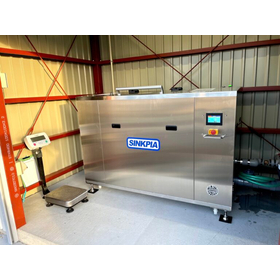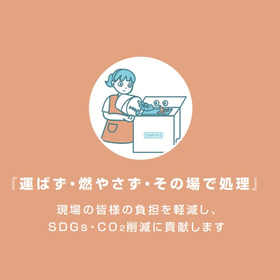Commercial Food Waste Processor Sink Pia [GJ-100]
Handle kitchen waste 'without transporting, without burning, and process it on the spot.'
Sink Pia is a commercial food waste processor that biodegrades organic waste using the power of microorganisms. Conventional products require the removal of residual waste after processing, and their installation locations are limited. Sink Pia eliminates the hassle of removing residues by using its unique microbial decomposition technology to biodegrade food waste into liquid form in about 24 hours. 【No Need for Residue Removal】 - Since microorganisms decompose food waste into liquid, there is generally no need for removal like with composting or drying types. 【Compact Size】 - Among the smallest in the industry. It utilizes a variety of microorganisms and an excellent microbial house to suppress odors during decomposition. 【Energy-Efficient Design】 - Not using thermal processing, it has low running costs. 【Flexible Installation Locations】 - Can be installed both outdoors and indoors, making it suitable for various locations such as kitchens, cleaning rooms, processing rooms, and waste storage areas. 【Contributing to Work Style Reform】 - Reduces the time and effort required for food waste processing, alleviating the burden on workers. 【Contribution to the Environment】 By self-processing food waste, it reduces CO2 emissions and contributes to the SDGs. Sink Pia aims to solve the challenges of food waste processing and achieve a comfortable environment and a sustainable society.
basic information
"Sink Pia," which overturns the conventional wisdom of food waste processors. 【Aesthetics and Cleanliness with Stainless Steel Housing】 - Adopts a high-quality stainless steel housing that stands apart from conventional products, comparable to kitchen equipment. - Creates a clean and sophisticated space. 【Efficient Biodegradation with High-Performance Microorganisms】 - Unique microorganisms, "Sinkzyme," efficiently biodegrade food waste. - The "Microbial House," which serves as the habitat for microorganisms, comes in four types. The optimal combination is selected based on the ingredients being processed. - Significantly improves the living environment for microorganisms compared to traditional wood chips and rice husks, enhancing biodegradation capability. 【Reduction of Environmental Impact and Cost Savings】 - Efficient biodegradation greatly reduces transportation costs for food waste compared to incineration. - Contributes to reducing CO2 emissions and lowering environmental impact by enabling self-processing at business sites. 【Improved Work Efficiency】 - Designed for easy operation by anyone, making indoor installation possible, which was difficult with conventional models. - Multiple feedings are possible as long as daily limits are observed. Using small buckets for feeding reduces the burden on the site. - Large machines can also be fed using options like lifts. 【Robust Maintenance System】 - A maintenance system is in place after installation, ensuring comprehensive after-sales support.
Price information
Please contact us.
Delivery Time
Model number/Brand name
SINKPIA GJ-100
Applications/Examples of results
**Our Initiatives** - We are committed to the philosophy of "not transporting, not incinerating, and processing on-site" for organic waste, and we develop, provide, and operate accordingly. - We are working on the development of commercial organic waste processors that safely and comfortably handle organic waste. - SINKPIA products vary in processing time depending on the type of organic waste, but generally, processing is completed within 24 hours. - By regularly operating the stirring and shower functions to manage the necessary "oxygen," "water," and "temperature" for microbial activation, we maintain the environment within the processing tank, allowing microorganisms to efficiently biodegrade organic waste. - We are engaged in the development of biodegradable carriers, resource recovery of decomposition liquids as soil conditioners, and research on processing biodegradable containers. - We actively participate in exhibitions across Japan, where we demonstrate the actual input of organic waste in our booth. **Wide Range of Implementation Results** Our systems have been implemented in various establishments, including restaurants, convenience stores, supermarkets, food service centers, roadside stations, service areas, food factories, employee cafeterias, hotels, hospitals, nursing facilities, wedding venues, ships, schools, and daycare centers. Implementation results are showcased in catalogs and exhibitions. For more detailed information and case studies, please visit the SINKPIA website.
Detailed information
Related Videos
catalog(3)
Download All CatalogsNews about this product(2)
-

"Achieving Zero Incineration of Organic Waste" Circular Economy News (Issue No. 1450)
An article about Hotel Nikko Princess Kyoto, which has introduced our food waste processor SINKPIA (GJ-100), was published in the Circular Economy Newspaper (Issue No. 1450). Kyoto City has been working on waste composition surveys since 1980, and in March 2015, it established the "New Kyoto City Waste Reduction Plan," setting food loss reduction targets ahead of the national standard. The city has also developed various certification systems related to waste generation suppression and has become a leading city in waste reduction, actively promoting initiatives in collaboration with businesses and citizens. Additionally, this initiative has been simultaneously certified and awarded as a "2R Special Excellent Business" and "2R and Excellent Business for Sorting and Recycling Activities" by Kyoto City.
-

Monthly Waste, October 2019 Issue
[Notice of Article Publication] Magazine for Proposals on Environmental Conservation and Resource Recycling 'Monthly Waste October Issue' Feature Together with Citizens Food Loss Countermeasures [CLOSE UP] Achieving Zero Incineration of Food Waste, Introduction of Processing Machines as a Turning Point Thank you for the interview. *Permission for publication has been obtained.
Recommended products
Distributors
"What we want you to discard is the conventional wisdom of food waste disposal machines." The development concept of Sink Pia is to process food waste 'without transporting, without burning, and on-site.' By self-processing food waste within facilities, it contributes to CO2 reduction and the SDGs. Japan's food waste disposal, which has relied heavily on incineration, is at a turning point, and many companies are entering the food waste processing machine industry to meet the needs of the times. However, it is also an industry where many companies have been forced to withdraw due to issues related to research and development costs, as well as a lack of knowledge, experience, and skills. Some have already started demonstration experiments, focusing on the development of microbial houses using biodegradable materials, the development of devices for processing dirty biodegradable containers, and further research on resource recovery such as liquid fertilizers and soil conditioners from decomposed water. We aim to be a company that is needed by more customers and can realize a society that is friendly to the future of the Earth's environment.

































































